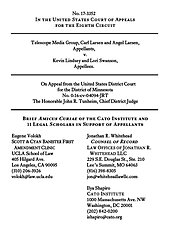Learn more about Cato’s Amicus Briefs Program.
Carl and Angela Larsen are videographers who offer their skills to those getting married, capturing the magic of that special day for posterity. The state of Minnesota requires that they film same-sex as well as opposite-sex weddings. The Larsens, who believe in traditional marriage, object to the state’s claimed power to compel them to produce expressive messages with which they disagree. They brought a lawsuit to vindicate their First Amendment rights.
Nearly three years have passed since the Supreme Court recognized the constitutional right of gay couples to commit themselves in marriage on equal terms with their fellow straight citizens. In that time, the debate has shifted from the status of these unions to the rights of those who do not wish to participate in the vows. In December, the Supreme Court heard oral argument on the question of whether bakery owners may be compelled by law to decorate cakes in celebration of these nuptials, with a decision expected in June. Cato filed a brief in that case supporting the baker—the only organization to do so that also filed briefs supporting the plaintiffs in Obergefell and the other marriage cases—and his right to refrain from conveying messages with which he disagrees.
We likewise have now filed a brief in the U.S. Court of Appeals for the Eighth Circuit in support of the videographers’ right to do the same, joined by 11 professors of constitutional law. We advocated that the Supreme Court extend the bonds of matrimony to gay couples—and just as their rights should be respected by the government, so too should the rights of those who disagree with us.
Just as the government cannot demand a Cato scholar write an article supporting the government’s preferred policy, it cannot compel those in expressive professions like filmmaking, photography, or musical performance to harness their artistic gifts in support of the state’s message. That the artists are offering their services commercially is no matter; how many rock bands play all their gigs for free?
A world of government-approved art would be a boring one indeed. If you doubt this, attend a gallery exhibition of socialist realism.
